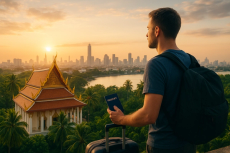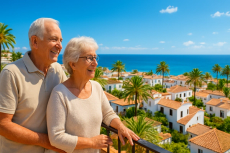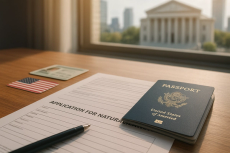Blog • Published on:June 23, 2025 | Updated on:June 23, 2025 • 8 Min
What You Need to Know About Staying Safe in Antigua and Barbuda
Thinking of heading to Antigua in 2025, whether to explore the beaches or to set down roots? Here's the deal: Antigua and Barbuda is still considered one of the more peaceful Caribbean destinations, but it's not immune to the same challenges facing the region.
Crime stats saw a slight uptick in the past year, with petty theft and burglary being the most reported issues. That said, violent crime remains relatively rare, especially in areas frequented by tourists and expats. Most visitors never encounter trouble, but being informed goes a long way toward staying safe.
In this guide, we’ll cover exactly what you need to know, clear facts, local insights, and practical tips, whether you're visiting for a week or planning a long-term stay. Ready to get a clearer picture?
Overview of Safety in Antigua and Barbuda
How Safe Is Antigua Compared to Other Caribbean Nations?
Antigua and Barbuda ranks as moderately safe when stacked against its Caribbean neighbours. While it doesn’t lead the region in safety metrics, it also doesn't sit among the riskiest. For context:
Note: These rankings reflect 2025 estimates from international safety and public security datasets.
What the Numbers Say
According to local law enforcement reports, Antigua and Barbuda saw a 9% overall increase in crime in 2024, driven mainly by thefts and home burglaries.
Violent crimes remain relatively rare and are generally isolated to specific neighborhoods, away from tourist zones or gated residential areas.
Still, Antigua maintains a lower crime burden than the regional average, and its homicide rate is significantly below that of countries like Jamaica or Trinidad and Tobago.
The country continues to be seen as a safer bet for retirees, digital nomads, and real estate investors, particularly those prioritizing a Caribbean lifestyle without extreme security concerns.
Where Safety is Most Noticeable
- Tourist Corridors: Areas like Dickenson Bay, English Harbour, and Jolly Harbour are well-patrolled and regularly monitored.
- Ports & Airports: Security at V.C. Bird International Airport is considered efficient, with visible police presence and modern screening systems.
- Community Initiatives: The government has launched neighbourhood watch programs and increased patrols in known trouble zones since late 2023.
Crime Rates and Security Measures
What Types of Crime Are Most Common in Antigua?
The majority of crimes reported in Antigua fall into non-violent categories, with property-related incidents being the most frequent.
Most incidents occur when basic safety steps are ignored, leaving valuables visible, homes unsecured, or engaging with unlicensed guides.
Are Tourists Frequently Targeted?
Tourist-targeted crime remains low, especially when visitors stick to popular beach areas and resorts. Issues that do occur are typically opportunistic:
- Pickpocketing at festivals or crowded events
- Bag snatching on public beaches
- Unofficial taxis charging inflated prices or operating without regulation
There are no known patterns of organized crime targeting tourists in Antigua as of 2025. Still, travelers are advised to:
- Avoid isolated areas at night
- Use licensed taxis or resort-recommended drivers
- Keep valuables in hotel safes or hidden from plain sight
Is Law Enforcement Visible and Active?
Yes, particularly in tourist zones. The Royal Police Force of Antigua and Barbuda has increased its patrols in known hotspots since 2023 and launched “Tourist Safety Units” at key attractions. These officers:
- Speak multiple languages
- Are trained to assist foreign visitors
- Operate in uniform and are easily identifiable
Police response time has also improved in urban areas, thanks to GPS-dispatched patrols and mobile reporting apps introduced in 2024.
Safety for Real Estate Investors and Residents
Gated Communities and Secure Living
For those relocating or investing in Antigua, safety often begins with location. Gated communities such as Jolly Harbour, Sugar Ridge, and Cedar Valley are among the most secure residential areas.
These zones benefit from private security, controlled access, and established expat populations. Most buyers in these communities cite peace of mind and low incident rates as key reasons for their choice.
Property Crime Statistics
While Antigua sees fewer violent crimes than other Caribbean nations, property crimes like break-ins still occur, mostly in unsecured or unattended homes.
Last year, there was a slight increase in residential burglary, particularly in rural or less developed districts. Homes that are part-time occupied or left vacant are more likely to be targeted, especially those without visible security measures.
Home Security Recommendations
Residents are strongly advised to install basic deterrents. These include door reinforcements, window locks, motion sensor lighting, and CCTV systems.
Many homeowners also use alarm services monitored by local security companies. It's also common practice to employ a caretaker when properties are unoccupied for long periods.
Neighbourhood Safety Guidelines
Choosing a neighbourhood with active local engagement makes a measurable difference. Areas close to expat hubs and tourist infrastructure tend to have better lighting, faster police response, and stronger community oversight.
By contrast, more remote inland locations might lack immediate access to emergency services or reliable connectivity.
Health Safety and Medical Care
Antigua offers basic but reliable health services for both residents and visitors, with most medical needs covered locally.
However, for anything beyond routine care, evacuation to nearby countries is often required.
- Mount St. John’s Medical Centre in St. John’s is the main public hospital, handling emergencies and general care. It’s the go-to for urgent treatment but wait times can vary.
- Adelin Medical Centre, a private facility, is preferred by many expats and long-stay visitors. It offers faster service and modern diagnostics for non-critical cases.
Specialist services are limited, so patients with complex conditions are usually transferred to Barbados or the U.S. for advanced care.
It’s common practice to hold international health insurance with evacuation coverage, particularly among retirees and property owners.
Safety Tips for Visitors and Residents
Staying safe in Antigua is mostly about being aware and prepared. While crime levels remain moderate, especially for tourists and expats, taking a few smart precautions can make a big difference.
Personal Safety Precautions
- Stick to well-lit, populated areas after dark, especially in St. John’s or rural villages.
- Use licensed taxis or transport arranged by hotels or villa hosts. Unofficial taxis may lack regulation or safety checks.
- Secure your belongings in accommodations, use in-room safes and avoid leaving valuables unattended, particularly at beaches.
- Don’t display expensive jewelry or tech in public, especially in non-tourist zones.
- Avoid ATMs in isolated locations. Choose machines attached to banks or major hotels.
- Install basic home security if residing long-term, alarms, cameras, and reinforced locks are widely used.
Comparing Safety with Other Caribbean Destinations
How Does Antigua Stack Up in 2025?
Compared to other Caribbean nations, Antigua and Barbuda sits in the middle of the safety spectrum.
It doesn’t match the lower crime rates of destinations like Barbados or the Cayman Islands, but it remains considerably safer than countries such as Jamaica, Trinidad & Tobago, or the Dominican Republic, especially in terms of violent crime.
Tourists and expats in Antigua report fewer instances of assault or robbery than in many larger islands. Police visibility around resorts and airports contributes to this, as does the relatively small population and slower pace of daily life.
The absence of widespread gang activity also separates Antigua from some neighbouring countries where organized crime has a larger footprint.
Safety Trends to Watch in 2025
Antigua’s crime rate showed a mild increase in 2024, mainly in non-violent categories like theft and home break-ins. However, government responses, including community policing, surveillance in key zones, and tighter regulation of short-term rentals, are helping stabilize the trend.
The country’s commitment to preserving tourism safety remains strong, and real estate-driven residential growth continues to prioritize gated, patrolled communities.
Looking ahead, safety in Antigua is expected to hold steady or improve slightly, barring regional instability or economic shocks.
Continued investment in tourism infrastructure and public security suggests the island is positioning itself to remain competitive with safer, high-demand Caribbean destinations.
FAQs About Safety in Antigua and Barbuda
1. Is Antigua safe for solo travellers?
Yes, especially in tourist areas. Solo travellers should stick to well-known beaches, use licensed taxis, and avoid isolated areas at night, just as they would in any destination.
2. Are there areas in Antigua tourists should avoid?
While most of the island is safe, parts of St. John’s outside the main commercial zone and neighbourhoods like Grays Farm and The Point are best avoided after dark unless you're with a local or on guided transport.
3. Is healthcare in Antigua reliable in emergencies?
Basic emergency care is available at Mount St. John’s Medical Centre. For serious conditions, patients are often transferred to Barbados, Puerto Rico, or Miami. Travel insurance with medical evacuation is recommended.
4. Do I need to worry about natural disasters?
Hurricane season runs from June to November. The island has early warning systems and disaster protocols, but travellers and residents should stay informed and prepared during this period.
5. Is Antigua a good place to invest in property in terms of safety?
Yes. Most expats buy in gated communities with private security. Crime is relatively low in these zones, and local authorities support property owners with security infrastructure and rapid response systems.
References
Statistics Division, Ministry of Finance and Corporate Governance. (2025). Crime and justice. Government of Antigua and Barbuda. Retrieved from https://statistics.gov.ag/crime-and-justice/staistics.
Ministry of Health, Wellness and the Environment. (2025). Antigua and Barbuda emergency medical services. Government of Antigua and Barbuda. Retrieved from https://health.gov.ag/departments/antigua-and-barbuda-emergency-medical-services/health.
Royal Police Force of Antigua and Barbuda. (2025). Home. Government of Antigua and Barbuda. Retrieved from https://police.gov.ag/police.
Statistics Division, Ministry of Finance and Corporate Governance. (2025). Travel and tourism. Government of Antigua and Barbuda. Retrieved from https://statistics.gov.ag/subjects/travel-and-tourism/statistics.
Ministry of Health, Wellness and the Environment. (2025). Home. Government of Antigua and Barbuda. Retrieved from https://health.gov.ag/health.
Written By

João Silva
João Silva is a seasoned consultant in the global mobility industry with over 12 years of experience. Specializing in European residency and citizenship by investment programs, João has assisted hundreds of high-net-worth clients in securing their second citizenship through strategic investments in real estate and government bonds.
Related Articles









Recently Published









Book a free consultation


